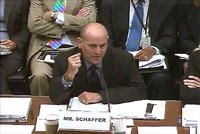-
Smartphone can spy on computer keyboard strikes
In hundreds of millions of offices around the world, this routine repeats itself every day: People sit down, turn on their computers, set their mobile phones on their desks, and begin to work; now, what if a hacker could use that phone to track what the person was typing on the keyboard just inches away?
-
-
Greatest cyber vulnerabilities are people, says cybersecurity expert
Dr. Cedric Jeannot, the founder and president of I Think Security, recently sat down with Eugene K. Chow, the executive editor of Homeland Security NewsWire, to discuss the latest rash in cyberattacks on companies, why hackers have been so successful, and the fallout from the RSA SecurID attacks
-
-
Lockheed Martin hosts 150 Md. students in cybersecurity event
Top performing Science, Technology, Engineering and Mathematics (STEM) high school students from Maryland gathered yesterday at Lockheed Martin’s NexGen Cyber Innovation & Technology Center to explore cyber security careers, education, and to promote safe online practices through a series of lessons and interactive stations
-
-
SEC requires businesses to disclose cyberattacks
Last week, the U.S. Securities and Exchange Commission (SEC) unveiled new guidelines that will make it mandatory for companies to report cyberattacks against their networks as well as the costs associated with them to their investors
-
-
Business group: cybersecurity critical to U.S. economic, national security
The Technology CEO Council says that Private sector steps to strengthen the U.S. digital infrastructure combined with new policies and government actions are important to America’s national and economic security
-
-
Also noted
SEC Says Companies Should Disclose Cyber-Incidents, Risks to Investors | Few in California have insurance for a big earthquake | N.Y. non-profits receive millions in security grants from 2006 to 2009 | Mexican smugglers tunnel beneath Arizona parking lots | ‘Israel will target prisoners who return to terrorism’ | Thai Floods Threaten Public and Private Research | New Metal Deposits Found at Rare Earth Mine | Lawmakers suggest treating drug cartels as terrorist organizations | Private U.K. security firm takes inmates to court in taxis
-
-
The "lost decade" of cybersecurity: adversaries outpace cyber-defenses
Anup Ghosh, the founder and CEO of Invincea, a firm that specializes in developing cybersecurity solutions, discusses the failures of the U.S. government in cybersecurity, emerging technologies that can help keep networks safe, and the havoc that terrorists can wreak via a cyberattack
-
-
General Dynamics teams up with Virginia Tech to bolster cybersecurity
Defense giant General Dynamics’ cybersecurity division has teamed up with Virginia Tech to help strengthen the nation’s cybersecurity research capabilities; on Wednesday, the company announced that its Advanced Information Systems branch will assist Virginia Tech with its new Security and Software Engineering Research Center (S2ERC)
-
-
IBM acquires security threat, fraud detection software developer
Acquisition extends IBM’s menu of offerings for governments, law enforcement, retail, insurance, and healthcare clients in what the company describes as “the Era of Smarter Cities”
-
-
New Windows worm spreading by exploiting weak passwords

A new Windows worm is spreading through company networks by exploiting weak passwords; the worm, dubbed “Morto” spreads using RDP, or Remote Desktop Protocol, the Microsoft-made protocol for controlling one computer by connecting to it from another
-
-
Recent deluge of cyber attacks results in record spending
The deluge of high profile cyber attacks on major corporations and government entities like the U.S. Senate, the CIA, and Sony has driven a sharp increase in demand for cyber security experts; in the first six months of this year alone, cyber attacks and data breaches have cost U.S. companies approximately $96 billion, nearly the total for 2010; analysts project 2011 to be the busiest year yet with an estimated $75.6 billion in cyber security spending, surpassing last year’s record $63 billion
-
-
Combating counterfeit microchips // by Dr. James Hayward, Ph.D, Sc.D.
Dr. James Hayward, the chairman, president, and CEO of Applied DNA Sciences, argues that the U.S. government needs to do more to prevent corrupted microchips from entering U.S. computers that make it easier for hackers and foreign governments to infiltrate networks
-
-
Malware imported into U.S. on foreign-made components

A high level DHS official acknowledged that malware built into imported electronic components sold in the United States poses a serious threat to U.S. economy and security; he also said it was a complex threat which the federal government has been trying to address in different ways; Greg Schaffer, acting deputy undersecretary for the National Protection and Programs Directorate at DHS, said the threat is “one of the most complicated and difficult challenges we have”
-
-
Cybercrime statistics wildly inaccurate, says researcher
A cybersecurity researcher is questioning the various statistics that government officials and IT companies use as evidence of the rampant and deleterious effects of hackers; Cormac Herley, a principal researcher at Microsoft Research, argues that the existing data on the estimated losses from cyberattacks is wildly inaccurate to the point that analysts have no idea what the problem’s economic impacts are; one expert, noting that estimates of the annual cost of cybercrime range from $560 million to $100 billion to $1 trillion, asks: “How can this be? How can you have estimates of the same problem ranging across three orders of magnitude?”
-
-
Cyberattacks spark cyber insurance boom
The recent spate of high profile cyberattacks on major corporations has sparked a rush for cyber security insurance; with companies and even local governments seeking financial protection from costly cyberattacks, insurance companies and analysts say demand has increased dramatically of late; some large companies have even taken out insurance policies worth as much as $200 million; local governments like Flathead County, Montana have also purchased cyber insurance
-
- All
- Regional
- Water
- Biometrics
- Borders/Immig
- Business
- Cybersecurity
- Detection
- Disasters
- Government
- Infrastructure
- International
- Public health
- Public Safety
- Communication interoperabillity
- Emergency services
- Emergency medical services
- Fire
- First response
- IEDs
- Law Enforcement
- Law Enforcement Technology
- Military technology
- Nonlethal weapons
- Nuclear weapons
- Personal protection equipment
- Police
- Notification /alert systems
- Situational awareness
- Weapons systems
- Sci-Tech
- Sector Reports
- Surveillance
- Transportation
Advertising & Marketing: advertise@newswirepubs.com
Editorial: editor@newswirepubs.com
General: info@newswirepubs.com
2010-2011 © News Wire Publications, LLC News Wire Publications, LLC
220 Old Country Road | Suite 200 | Mineola | New York | 11501
Permissions and Policies
Editorial: editor@newswirepubs.com
General: info@newswirepubs.com
2010-2011 © News Wire Publications, LLC News Wire Publications, LLC
220 Old Country Road | Suite 200 | Mineola | New York | 11501
Permissions and Policies
